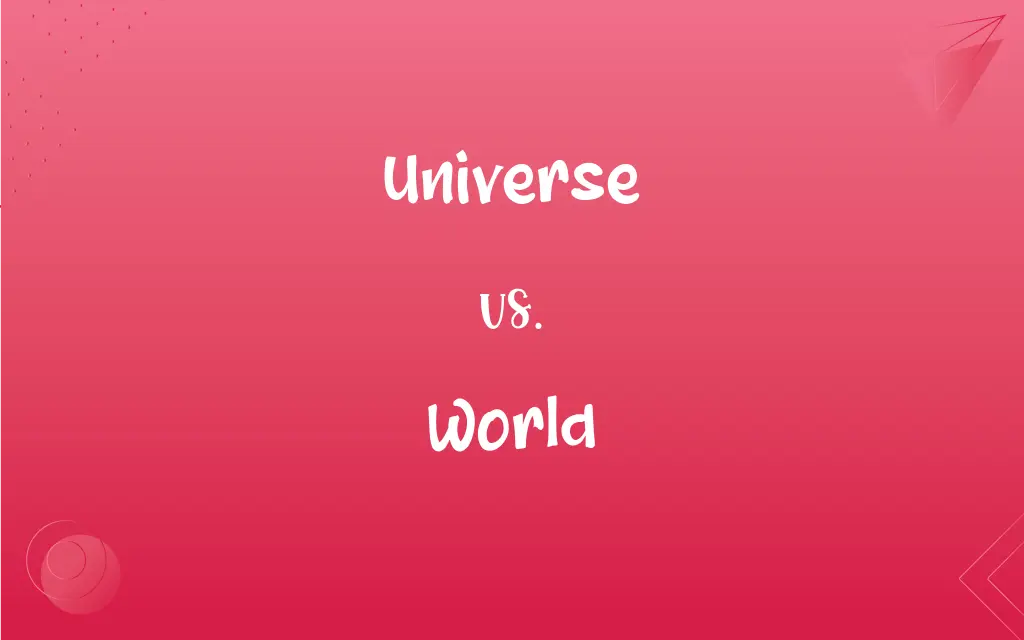Universe vs. World: What's the Difference?
Edited by Harlon Moss || By Janet White || Published on December 3, 2023
The universe encompasses all of space, time, matter, and energy, while the world typically refers to Earth or the human experience on it.

Key Differences
The universe is a vast, all-encompassing term that includes every galaxy, star, planet, and particle, as well as the entirety of space and time, whereas the world usually refers to Earth or the human experience and life on it.
Universe implies an astronomical or cosmological scope, covering the entire physical reality, while world often has a more anthropocentric or geopolitical meaning, relating to human society and its cultures.
In scientific contexts, the universe is used to discuss topics like the Big Bang, black holes, and astrophysics, whereas the world is used in discussions of geography, history, and international relations.
Philosophically, the universe can represent the totality of existence, while the world can symbolize the realm of human experiences and societal constructs.
The use of universe in literature and conversation often conveys a sense of vastness and mystery, while world tends to evoke aspects of humanity, nature, or the planet Earth.
ADVERTISEMENT
Comparison Chart
Scope
All of space and time
Primarily Earth and human experiences
Usage in Science
Astronomy, cosmology
Geography, ecology, human societies
Philosophical Meaning
Totality of existence
Realm of human experience
Common Context
Astrophysics, space exploration
International relations, culture, nature
Connotation
Vastness, entirety
Humanity, global, Earthly
ADVERTISEMENT
Universe and World Definitions
Universe
All existing matter and space considered as a whole.
Scientists study the origins of the universe.
World
The Earth, together with all of its countries and peoples.
Traveling allows you to experience different cultures of the world.
Universe
The cosmos, including galaxies, stars, and planets.
The Hubble Telescope captures stunning images of the universe.
World
A particular period in history or a stage of life.
The medieval world was vastly different from today.
Universe
A particular sphere or realm of activity or interest.
In her universe, music is the most important thing.
World
All that relates to human life and civilization.
The digital world has transformed how we communicate.
Universe
The whole world of a particular person's experience.
To a child, their family might be their entire universe.
World
A particular group of living things, the human race, or human affairs.
The animal world is diverse and fascinating.
Universe
A hypothetical or fictional realm.
The Marvel Universe is full of superheroes.
World
A realm or sphere of activity or interest.
In the world of fashion, trends constantly change.
Universe
All spacetime, matter, and energy, including the solar system, all stars and galaxies, and the contents of intergalactic space, regarded as a whole.
World
The earth, especially together with the life it supports
A chemical found all over the world.
An ecological disaster that could threaten the entire world.
Universe
A hypothetical whole of spacetime, matter, and energy that is purported to exist simultaneously with but to be different from this universe
An alternate universe.
World
The universe
How the ancients conceived the world.
FAQs
Is the universe bigger than the world?
Yes, the universe is vast and encompasses the entire cosmic existence, including countless worlds.
What is the universe?
The universe is the totality of space, time, matter, and energy.
Can world refer to other planets?
While it usually refers to Earth, 'world' can be used for other planets in a broader sense.
Is universe used in a non-scientific context?
Yes, it can be used metaphorically or in fictional settings.
Does universe include Earth?
Yes, Earth is a small part of the vast universe.
Is world used in international relations?
Yes, it's frequently used in the context of geopolitics and global issues.
Is world used in literature?
Yes, often to describe settings, eras, or human experiences.
Does world always mean Earth?
Often, but it can also refer to specific aspects of human life or civilization.
What is the world?
The world typically refers to Earth and the human experience on it.
Can world be used philosophically?
Yes, it can symbolize the realm of human experiences and societal constructs.
Is the universe always expanding?
Scientifically, yes, the universe is currently expanding.
How do astronomers study the universe?
Through telescopes, spacecraft, and various forms of astrophysical research.
How do different cultures view the universe?
Views vary widely, influenced by scientific, philosophical, and religious perspectives.
Do the terms universe and world have different origins?
Yes, they come from different linguistic roots and have evolved over time.
Can universe be used in a spiritual context?
Yes, it's sometimes used to convey a sense of cosmic spirituality or unity.
Can universe have a personal meaning?
Yes, it can represent an individual's entire realm of experience or interest.
Does world refer to nature?
It can include nature, especially in ecological contexts.
Is world a common term in geography?
Yes, especially when discussing the Earth's physical features or human societies.
Are there fictional worlds within the universe?
In literature and media, 'world' often refers to imaginary places within the broader concept of a universe.
Do universe and world have different connotations in poetry?
Yes, universe often conveys a sense of vastness and mystery, while world tends to be more grounded in human experience.
About Author
Written by
Janet WhiteJanet White has been an esteemed writer and blogger for Difference Wiki. Holding a Master's degree in Science and Medical Journalism from the prestigious Boston University, she has consistently demonstrated her expertise and passion for her field. When she's not immersed in her work, Janet relishes her time exercising, delving into a good book, and cherishing moments with friends and family.
Edited by
Harlon MossHarlon is a seasoned quality moderator and accomplished content writer for Difference Wiki. An alumnus of the prestigious University of California, he earned his degree in Computer Science. Leveraging his academic background, Harlon brings a meticulous and informed perspective to his work, ensuring content accuracy and excellence.







































































